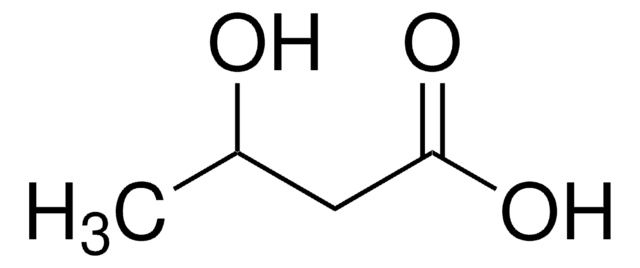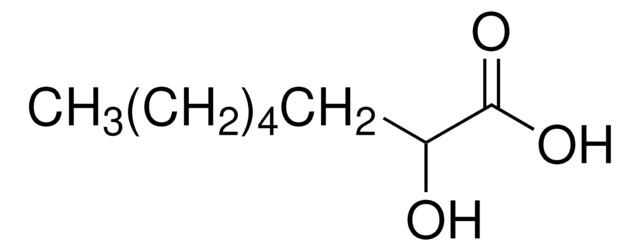H3648
(±)-3-Hydroxydecanoic acid
≥98%
Synonym(s):
DL-β-Hydroxycapric acid
Sign Into View Organizational & Contract Pricing
All Photos(1)
About This Item
Empirical Formula (Hill Notation):
C10H20O3
CAS Number:
Molecular Weight:
188.26
MDL number:
UNSPSC Code:
12352211
PubChem Substance ID:
NACRES:
NA.25
Recommended Products
Quality Level
Assay
≥98%
form
powder
functional group
carboxylic acid
lipid type
saturated FAs
shipped in
ambient
storage temp.
2-8°C
SMILES string
CCCCCCCC(O)CC(O)=O
InChI
1S/C10H20O3/c1-2-3-4-5-6-7-9(11)8-10(12)13/h9,11H,2-8H2,1H3,(H,12,13)
InChI key
FYSSBMZUBSBFJL-UHFFFAOYSA-N
Application
- LORE receptor homomerization is required for 3-hydroxydecanoic acid-induced immune signaling and determines the natural variation of immunosensitivity within the Arabidopsis genus.: This study unveils the crucial role of 3-Hydroxydecanoic acid in mediating immune responses through LORE receptor homomerization in plants, providing insights into the molecular mechanisms of plant defense and potential agricultural applications (Eschrig et al., 2024).
Storage Class Code
11 - Combustible Solids
WGK
WGK 3
Flash Point(F)
Not applicable
Flash Point(C)
Not applicable
Personal Protective Equipment
dust mask type N95 (US), Eyeshields, Gloves
Certificates of Analysis (COA)
Search for Certificates of Analysis (COA) by entering the products Lot/Batch Number. Lot and Batch Numbers can be found on a product’s label following the words ‘Lot’ or ‘Batch’.
Already Own This Product?
Find documentation for the products that you have recently purchased in the Document Library.
Customers Also Viewed
Ahmad Mohammad Abdel-Mawgoud et al.
Applied microbiology and biotechnology, 86(5), 1323-1336 (2010-03-26)
Rhamnolipids are glycolipidic biosurfactants produced by various bacterial species. They were initially found as exoproducts of the opportunistic pathogen Pseudomonas aeruginosa and described as a mixture of four congeners: alpha-L-rhamnopyranosyl-alpha-L-rhamnopyranosyl-beta-hydroxydecanoyl-beta-hydroxydecanoate (Rha-Rha-C(10)-C(10)), alpha-L-rhamnopyranosyl-alpha-L-rhamnopyranosyl-beta-hydroxydecanoate (Rha-Rha-C(10)), as well as their mono-rhamnolipid congeners Rha-C(10)-C(10)
Florian Bredenbruch et al.
Journal of bacteriology, 187(11), 3630-3635 (2005-05-20)
The role of intercellular communication in the regulation of bacterial multicellular behavior has received widespread attention, and a variety of signal molecules involved in bacterial communication have been discovered. In addition to the N-acyl-homoserine lactones, 4-hydroxy-2-alkylquinolines (HAQs), including the Pseudomonas
Q Qi et al.
Applied microbiology and biotechnology, 54(1), 37-43 (2000-08-22)
For the first time, the purification has been achieved of the type II polyhydroxyalkanoate (PHA) synthases PhaC1 and PhaC2 from Pseudomonas aeruginosa applying N-terminal His6-tag fusions and metal chelate affinity chromatography. In vivo His6-tagged PHA synthase activity was confirmed by
Anders Broberg et al.
Applied and environmental microbiology, 73(17), 5547-5552 (2007-07-10)
The metabolite production of lactic acid bacteria (LAB) on silage was investigated. The aim was to compare the production of antifungal metabolites in silage with the production in liquid cultures previously studied in our laboratory. The following metabolites were found
Evrim Acar et al.
Molecular nutrition & food research, 63(1), e1800215-e1800215 (2018-08-11)
Self-reported dietary intake does not represent an objective unbiased assessment. The effect of the new Nordic diet (NND) versus average Danish diet (ADD) on plasma metabolic profiles is investigated to identify biomarkers of compliance and metabolic effects. In a 26-week
Our team of scientists has experience in all areas of research including Life Science, Material Science, Chemical Synthesis, Chromatography, Analytical and many others.
Contact Technical Service


![Poly[(R)-3-hydroxybutyric acid] natural origin](/deepweb/assets/sigmaaldrich/product/structures/129/476/7d1c924b-f644-4889-a2d6-d7a923ce382c/640/7d1c924b-f644-4889-a2d6-d7a923ce382c.png)







